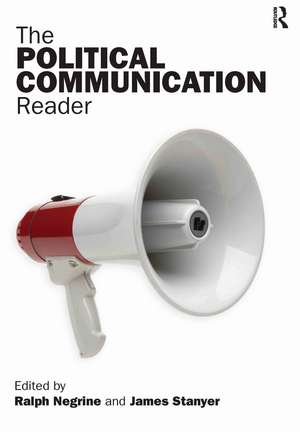The Political Communication Reader
Editat de Ralph Negrine, James Stanyeren Limba Engleză Paperback – 16 mai 2007
Gathering together key writings and many single-authored essays in to a handy one-volume resource, this is the only Reader currently available on political communication.
The selected texts and articles have been included for their significant contribution to our understanding of the issues under considerations, are grouped into thematic sections, each introduced by the editors, and the contributors cover such areas as:
- the exercise of power, media and democracy
- the media and elections
- media effects
- political participation and the media
- the personalization of politics
- new technologies and the reshaping of political communication.
Available as a companion Reader to Brian McNair's Introduction to Political Communication textbook, students will find The Political Communication Reader a valuable resource in this popular subject area.
Preț: 313.17 lei
Nou
59.93€ • 62.72$ • 49.88£
Carte disponibilă
Livrare economică 10-24 martie
Livrare express 21-27 februarie pentru 39.08 lei
Specificații
ISBN-10: 0415359368
Pagini: 336
Ilustrații: 8 black & white tables
Dimensiuni: 174 x 246 x 19 mm
Greutate: 0.62 kg
Ediția:1
Editura: Taylor & Francis
Colecția Routledge
Locul publicării:Oxford, United Kingdom
Cuprins
Introduction Section 1: Media and Democracy 1. Public Opinion Walter Lippmann 2. Rich Media, Poor Democracy Robert McChesney 3. The ‘Propaganda Model’ Jens Klaehn 4. Media Theory After the Fall of European Communism Colin Sparks 5. Rethinking Media and Democracy James Curran 6. The 'Mediatization' of Politics Gianpietro Mazzoleni and Winfried Schulz 7. The Political-Media Complex at 50 David Swanson 8. The Third Age of Political Communication Jay G. Blumler and Dennis Kavanagh Section 2: Media and Political Advocates 9. Politicians and the Press Jay G. Blumler and Michael Gurevitch 10. The News Media as a Political Institution Timothy Cook 11. We Keep America on Top of the World Dan Hallin 12. The Media Politics of Criminal Justice Philip Schlesinger and Howard Tumber 13. Media and Political Conflict Gadi Wolsfeld 14. Beyond Agenda Setting: Information Subsidies and Public Policy Oscar Gandy 15. Strategic Public Diplomacy Jarol B. Manheim Section 3: Elections and Campaigning 16. Platforms and Windows Elihu Katz 17. The Formation of Campaign Agendas Holli Semetko, Blumler, J., Gurevitch, M., Weaver, D., Barkin, S., and Wilhoit, G.C. 18. Packaging the Presidency Kathleen Hall Jamieson 19. The Wisdom of the War Room Maggie Scammell 20. The 'Americanization' of Political Communication Ralph Negrine and Stylianos Papathanassopouls 21. Politics, Media and Modern Democracy David Swanson and Paolo Mancini 22. Political Communications in Postindustrial Societies Pippa Norris Section 4: Marketing Politics 23. Professional Communication and the Means of Social Influence Leon H. Mayhew 24. New Frontiers in Political Professionalism Paolo Mancini 25. Professionalization: Of What? Since When? By Whom? Darren G. Lilleker and Ralph Negrine 26. Parties and Campaign Professionals in a Digital Age David M. Farrell, Robin Kolodny and Stephen Medvic 27. Global Political Campaigning Fritz Plasser with Gunda Plasser 28. The Politics of Marketing the Labour Party Dominic Wring 29. Political Marketing: Issues for Political Science Margaret Scammell Section 5: Media Effects 30. The Reinforcement Effect Paul F. Lazarsfeld, Bernard Berelson, and Hazel Gaudet 31. The Effects of Newspapers Pippa Norris, John Curtice, David Sanders, Margaret Scammell and Holli A. Semetko 32. The Agenda-Setting Function of Mass Media Maxwell E. McCombs and Donald L Shaw 33. Images/ Issues/ Impact: The Media And Campaign '92 Justin Lewis, Michael Morgan, and Andy Ruddock 34. Cognitive Bases for Framing Effects Joseph N. Cappella and Kathleen Hall Jamieson 35. Effects of Framing on Attributions of Responsibility for Crime and Terrorism Shanto Iyengar 36. The Audience is a Crowd, the Crowd is a Public: Latter-Day Thoughts on Lang and Lang's 'MacArthur Day in Chicago' Elihu Katz and Daniel Dayan Section 6: Media and Political Engagement 37. Technology and Mass Media Robert D. Putnam 38. The Long Campaign: The Politics of Tedium Thomas E. Patterson 39. Talking News, Talking Politics David Buckingham 40. Audience Engagement with Politically Incorrect Jeffery P. Jones 41. Public Access Broadcasting in the UK: A History Brian McNair, Matthew Hibberd, Philip Schlesinger 42. Media Participation: A Legitimizing Mechanism of Mass Democracy Erik P. Bucy and Kimberly S. Gregson Section 7: Personalization 43. The Evolution of Celebrityhood Darrell M. West and John Orman 44. Cultural Struggle, the New News, and the Politics of Popularity in the Age of Jesse 'the Body' Ventura Kevin Glynn 45. The Man fom Hope: Hyperreal Intimacy and the Invention of Bill Clinton Shawn J. Parry-Giles and Trevor Parry-Giles 46. Out of Order Larry J. Sabato, Mark Stencel and S. Robert Lichter 47. The Nature of Political Scandal John B. Thompson 48. What Happened to Sex Scandals? Politics and Peccadilloes, Jefferson to Kennedy John H. Summers Section 8: New Media, New Politics? 49. Communicating Global Activism: Strengths and Vulnerabilities of Networked Politics W. Lance Bennett 50. Smart Mobs: The Power of the Mobile Many Howard Rheingold 51. Networking Dissent: Cyber Activists Use the Internet to Promote Democracy in Burma Tiffany Danitz and Warren P. Strobel 52. Buzz, Blogs, and Beyond: The Internet and the National Discourse in the Fall of 2004 Michael Cornfield, Jonathan Carson, Alison Kalis and Emily Simon 53. Democratisation, Parties and the Net: Mexico ߝ Model or Aberration? Darren Wallis 54. How the Net Will Not Contribute to Democracy Michael Margolis and David Resnick
Recenzii
'This is a collection of some of the best works and finest writers in political communication. It provides the reader with a comprehensive overview of the state of the art and how the field developed over the last decades.' ߝ Christina Holtz-Bacha, Professor of Communication, University of Erlangen-Nuernberg, Germany
'a very useful book' ߝ The Australian Journal of Politics and History
Notă biografică
Ralph Negrine is Director of Research at the Department of Journalism Studies, University of Sheffield. His research interests are in political communication and media policy. Recent publications include Television and the Press Since 1945 (1999), and The Communication of Politics (1996). He is also co-editor of The 'Professionalization' of Political Communication in Europe (2007).
James Stanyer is Lecturer in Communication and Media Studies at the Department of Social Sciences, Loughborough University. His research focuses on developments in political communication in advanced industrial democracies. His work has appeared in a wide range of academic journals and he has also authored two books, The Creation of Political News (2001), and Modern Political Communication (2007).
Descriere
Gathering together key writings and many single-authored essays in to a handy one-volume resource, this is the only Reader currently available on political communication.
The selected texts and articles have been included for their significant contribution to our understanding of the issues under considerations, are grouped into thematic sections, each introduced by the editors, and the contributors cover such areas as:
- the exercise of power, media and democracy
- the media and elections
- media effects
- political participation and the media
- the personalization of politics
- new technologies and the reshaping of political communication.
Available as a companion Reader to Brian McNair's Introduction to Political Communication textbook, students will find The Political Communication Reader a valuable resource in this popular subject area.










